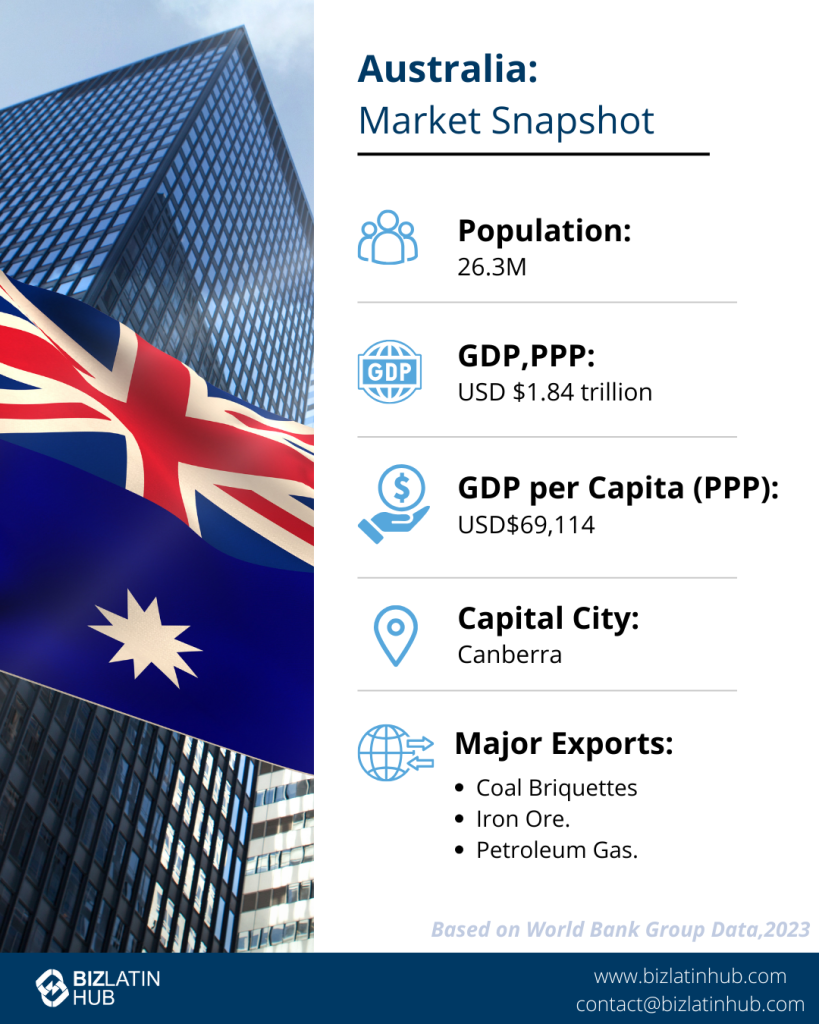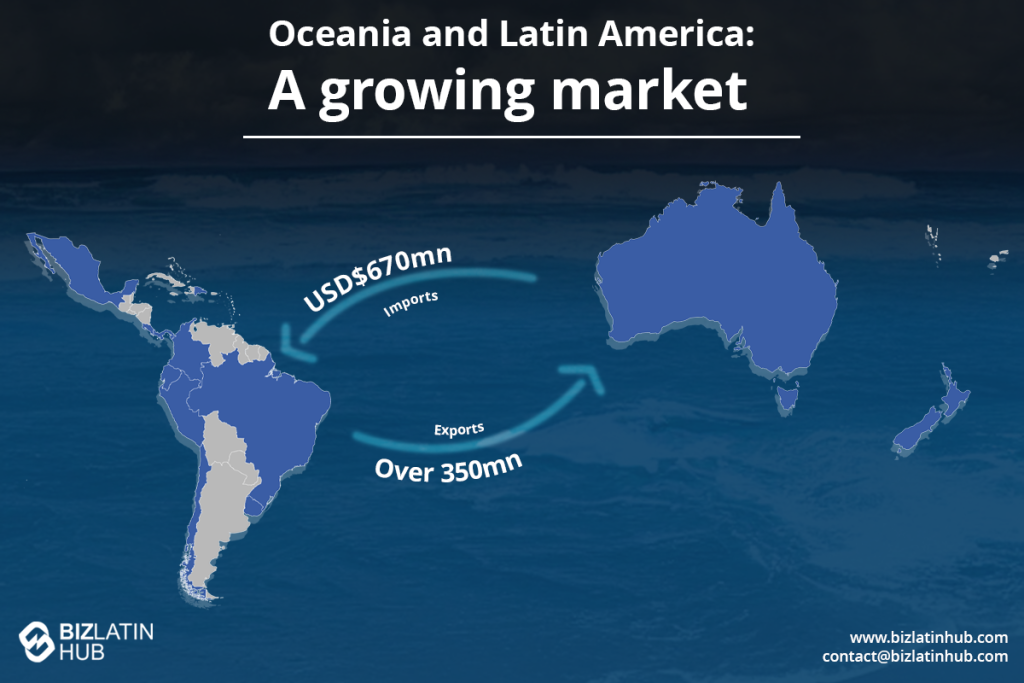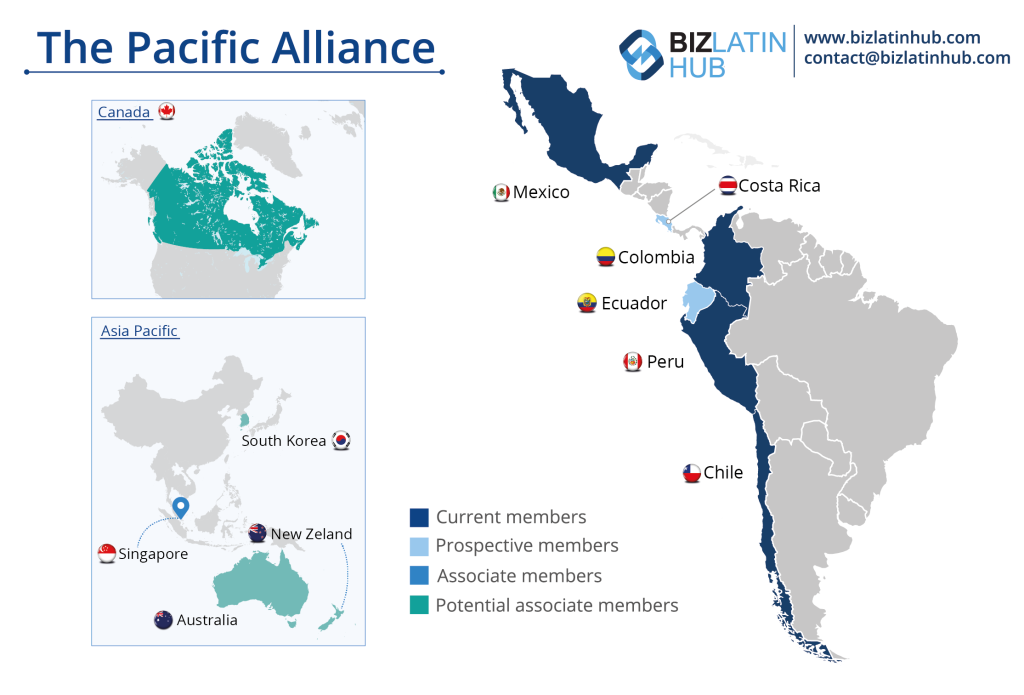Australian exports to Latin America are on the rise, thanks to greater regional development and demand. Australia’s economy holds the world record for consecutive quarterly GDP growth, spanning 26 years. The country sports one of the world’s freest economies and a high level of productivity. Australia’s GDP is currently nearly US$1.6 trillion.
Australia’s proximity to Asia has strongly influenced its international trade agenda to date. However, it is looking to diversify with Australian exports to Latin America a key part of that. There is a lot of potential in both markets and a great deal of overlap in certain areas, such as livestock and mining.
Australian exports to Latin America is such a growing market that an increasing number of businesses are looking at company formation in the region in order to fully establish themselves. At Biz Latin Hub, that’s our bread and butter, so we can help you not only with the initial process but provide ongoing support throughout your business life cycle.
Australian Exports to Latin America: international trade environment

Australia’s ‘free trade’ mantra and connection with powerful markets has developed a formidable economy that ranks twentieth largest in the world. Its exports to key trading partners topped US$253.8 billion in 2018 alone.
Due to its geography, Asia represents an overwhelming majority of Australia’s top two-way trading partners. This includes China, Japan, South Korea, Singapore, India and Thailand. Growth in Asia fuels increasing demand for minerals, agriculture, manufacturing, and education services from down under.
Latin America, on the whole, facilitates strong inter-regional trade and exportation of goods to its North American neighbors. As the region’s bigger economies blossom, so too does their exploration of new territory. Latin America’s ‘big four’ – Brazil, Mexico, Colombia and Argentina – have similarly seen Asian countries take top spots in trade rankings.
What’s on the cards for Australia and Latin America?
Australia’s imports from Latin America are growing. The most coveted sectors for Australians are in manufacturing, agriculture, and minerals and fuels. Export-wise, the Oceanic country also has great potential. A majority of these exports go to Brazil, Chile, Colombia, Mexico, and Argentina.
Though modest, there are a number of key areas export businesses should take note of for their growth potential. Although Asia plays a big role in trade for both Australia and Latin America, the growing wealth in the region is creating room for other players to step into.

Similarities in main sectors for Australian exports to Latin America
At a regional level, Latin America’s top four booming sectors include agriculture, mining and petroleum, manufacturing, and finance. Notably, those make up four of Australia’s biggest sectors as well. There’s therefore high potential for integration of Australia’s export products to Latin American economies.
With a high degree of economic similarity, Australia is perfectly placed to develop its two-way trade relationship with Latin American countries. It gives Australian businesses in the nation’s top industries the chance to cooperate further with the region and aid its developing markets.
Free trade agreements on the horizon
The country’s government is, however, aggressively seeking a higher level of connectivity with the region. The Australia-Chile FTA is a great model for future trade deals with Latin America. The FTA reduces barriers to exporting and importing, as well as investment. Over 200 Australian-owned businesses operate in Chile since the FTA came into force.
The Peru-Australia Free Trade Agreement (PAFTA) came into force in Feb 2020. Australian businesses are now able to enjoy greater transparency and consistency when operating in Peru.
PAFTA aims to eliminate tariffs on 99 per cent of Australian exports over the first five years. Reduced trade barriers to such a high extent will make Peru a key future export destination for Australia. Currently, there are over 90 Australian companies operating in Peru. This FTA sets to boost cooperation and trade even further between the two sturdy economies.
Comprehensive and Progressive Agreement for Trans-Pacific Partnership (CPTPP)
Australia is one of 7 countries to have ratified the Comprehensive and Progressive Agreement for Trans-Pacific Partnership (CPTPP). The CPTPP is a trade agreement between 11 countries: Australia, Brunei, Canada, Chile, Japan, Malaysia, Mexico, New Zealand, Peru, Singapore, and Vietnam. Together, these countries make up 13% of the global economy, amounting to around US$10 trillion in GDP.
A further 7 countries – including Colombia – are looking to gain membership to the CPTPP.
This agreement aims to deepen trade ties between members and strengthen bilateral and multilateral cooperation. For entrepreneurs, businesses and investors, this means easy access to a selection of strong, diverse markets.
Mexico was the first to ratify the agreement. President Enrique Peña Nieto stated: “With this new generation agreement, Mexico diversifies its economic relations with the world and demonstrates its commitment to openness and free trade.”
Pacific Alliance FTA
Perhaps the most exciting development in terms of Australia-Latin America cooperation is Australia’s FTA negotiations with the Pacific Alliance.
The Pacific Alliance is a powerful Latin American trading bloc made up of Mexico, Colombia, Chile and Peru. The trade bloc has the potential to become Latin America’s largest. Its member countries collectively form the eighth largest economy in the world.
With a Pacific Alliance FTA, Australian businesses and investors will gain further access to some of Latin America’s largest and fastest-growing economies.

Latin America’s evolving economic landscape
Latin America has historically experienced a large degree of economic neglect from major Western and European actors. Like many other countries, Australia is now catching on to the potential of the region. Identifying its economic similarities and business opportunities, Australia’s relationships with Latin America are set to strengthen.
As countries and regions within Latin America start to stabilize politically and economically, foreign business and investor confidence creeps up. The upwards trend of pro-foreign investment governments also provides a greater level of support for international commerce.
Latin America’s needs will evolve as the region continues to develop. Countries with growing middle classes (such as Brazil, Mexico, Colombia and Argentina) face increasing demand for local and international goods and services.
For Australia, the booming region offers promising potential in terms of two-way trade. Early investment and deal-making will give the Pacific powerhouse a strong foothold in emerging markets in the region.
Biz Latin Hub can support your Australian exports to Latin America
Although Australia is one of the world’s freest economies, it’s important to get the right support for setting up business. We can help make sure your commercial expansion runs as smoothly as possible.
Biz Latin Hub offers customized business solutions in a number of market-entry and back office services. Our Australia and Latin America teams offer expert support to ensure a smooth process for you and your business.
Contact us here at Biz Latin Hub and we’ll help you design a strategy to capitalize on your commercial opportunities.
Learn about our team and expert authors.






